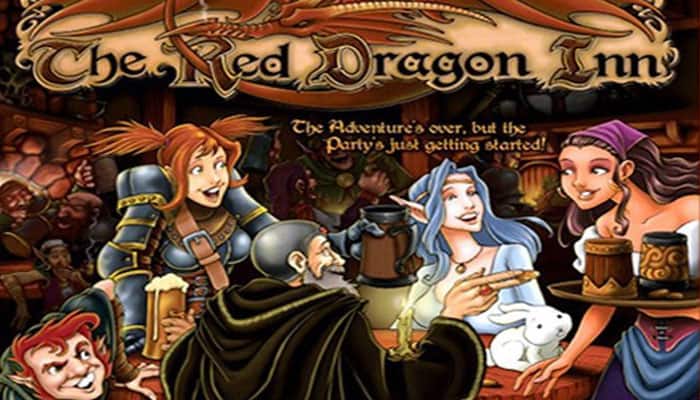
Welcome to the third installment of The Red Dragon Inn! If you have never played The Red Dragon Inn before, please read the first three pages of this document (up to "Other Rules") and the document marked "The Characters".
The "Other Rules" section is mainly clarifications that you may not need during your first game.
If you have played before, please read "The Characters" and review the "Other Rules" section, since a few of the rules may be different from what you're used to.

Components
- 4 Character Decks
- Serena's Piety Chart and Piety Marker
- Wizgille's Gear Deck
- Phrenk's Potion Deck
- Wulfiic Deck
- 4 Player Mats
- Drink Deck
- 4 Fortitude Markers (red)
- 4 Alcohol Content Markers (clear)
- Gold Pieces
- Instructions
Object of the Game
Keep your Gold and stay conscious. If you run out of Gold, or if your Alcohol Content is ever greater than or equal to your Fortitude, you are out of the game.
Setup
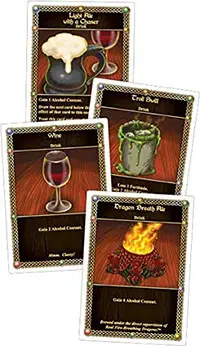
Shuffle the Drink Deck and place it where everyone can reach it Leave space for a discard pile next to the Drink Deck.
Each player takes a player mat, a red marker, a clear marker, and one of the Character Decks. Each player also takes the extra material for that character and sets it up as described in the document "The Characters".
Shuffle your Character Deck and place it on the space labeled Deck on your player mat. When you must discard Character Deck Cards, place them in the space labeled Discard on your Player Mat. Be sure to keep your Character Deck completely separate from your extra deck, if you have one. Do not use the same discard pile for both.
Take 10 Gold. This is your "Stash". (For games with 2 players, take 8 Gold instead. For games with 7 or more players, take 12 Gold instead). Put the extra Gold to the side. This is the "Inn".
Place the red marker on the 20 on your player mat. This is your Fortitude. Place the clear marker on the 0 on your player mat. This is your Alcohol Content.
Take a card from the Drink Deck and place it face down on the space labeled Drink Me! This is your Drink Me! Pile. Do not look at the cards in your Drink Me! Pile yet.
Draw the top seven cards from your Character Deck. This is your hand. You may look at these cards, but you must keep them hidden from the other players.
Choose someone to go first.

Game Play
Your turn consists of four Phases, which must be played in order: Discard and Draw, Action, Buy Drinks, Drink.
1. Discard and Draw
You may discard any cards from your hand that you do not want and then draw from your Character Deck until you are holding seven cards. You may not play any cards or effects until you have finished drawing cards.
If you draw the last card from your Character Deck, shuffle your discarded Character Cards and put them back on the Deck space on your player mat
If you are holding seven or more cards you may opt to keep all of them and draw no new cards.
2. Action
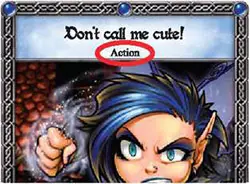
You may play one Action Card. To play an Action Card, read the title of the card out loud, give other players a chance to respond to the card, then follow any instructions on the card and discard it to the Discard space on your Player Mat.
If you play a "Gambling? I'm in!" card, you start a Round of Gambling. If you cannot or do not want to play an Action Card, skip this Phase.
3. Buy Drinks
Take the top card from the Drink Deck and place it face down, without looking at it, on top of any other player's Drink Me! Pile.
You do not have to pay Gold when you buy Drinks in this way. The Inn keeps a tab, and you will pay for these Drinks later. (See "More Drink Rules" below for details).
4. Drink

Reveal the top card of your Drink Me! Pile, follow the instructions on the card and place it in the Drink Deck discard pile.
If you don't have any cards on your Drink Me! Pile when you have to drink, you start to sober up; reduce your Alcohol Content by one.
Ending Your Turn
After you have resolved the effects of your Drink Phase, the player to your left goes next.
Sometimes and Anytime Cards
Sometimes Cards

Sometimes Cards can only be played under certain conditions. Each Sometimes Card states the conditions under which it can be played in the text on the card.
Some Sometimes Cards allow you to Negate or Ignore another card. These cards are described in "Negate and Ignore Effects" under "Other Rules".
You may play multiple Sometimes Cards in response to the same game event, even if they are multiple copies of the same card. However, you must play the cards one at a time and give your opponents an opportunity to respond to each one.
Anytime Cards

Anytime Cards can be played at any time, even if they interrupt another action.
Relevant Sometimes and Anytime Cards may be played in any Phase of a turn, either before or after the special action for that Phase.
For example, you may play an Anytime Card during your Discard and Draw Phase before you discard and draw.
If two or more players would like to play Sometimes or Anytime Cards at the same time, see "Timing" under "Other Rules".
Losing the Game
Running out of Gold
If you run out of Gold, the Wench kicks you out of the Inn and you must spend the rest of the night out in the stables. You are out of the game.
Passing Out
If your Alcohol Content is ever greater than or equal to your Fortitude, you fall unconscious and the Wench drags you up to your room to sleep it off. Your Gold is divided between the Inn and any players still in the game.
Split your Gold in half. One half, and any remainder goes to the Inn. What's left gets split evenly among the remaining players, with any remainder going to the Inn. You are out of the game.
If you run out of Gold or pass out, you don't lose immediately. First, finish resolving any cards that have been played but have not yet resolved. After these cards resolve, you have one last chance to play Sometimes or Anytime Cards to save yourself or attack others. If you can't save yourself, then you're out of the game.
If you have any cards in your Drink Me! Pile when you lose, put them in the Drink Deck discard pile.
It is possible for multiple players to lose at the same time. If this happens, first determine which players are passing out. Each of those players divides their Gold among the remaining players as described above.
After this, if any players have no Gold, they lose the game as well. This means that if one player passes out and another runs out of Gold simultaneously, the player who is running out of Gold could be saved by getting a share of the Gold ftom the other player!
If all remaining players would lose the game simultaneously, the game is a tie between those players.
Gambling
When a player plays "Gambling? I'm in!" as their Action, this starts a Round of Gambling.
When a Round of Gambling begins, normal play is suspended and each player must ante 1 Gold. To do this, they put 1 Gold in the middle of the playing area (make sure not to get this Gold confused with the Inn's Gold).
The player who started the Round of Gambling is currently winning ("in control" of the Round).
Play proceeds clockwise around the table from the player who started the Round. On your turn you may either play a Gambling or Cheating Card or pass.

-
Play a Gambling or Cheating Card: Playing either of these two types of card gives you control of the Round of Gambling. The card you play may have other effects, as well.
-
Pass: You may choose to pass instead of playing a card. You may pass even if you have a Gambling or Cheating Card that you could play. If you pass, you are still in the Round of Gambling and may play Gambling or Cheating Cards later in the Round, as long as the Round does not end first.
Ending The Round
If you play a Gambling or Cheating Card and everyone else passes, the Round of Gambling ends. You win. Take all of the anted Gold and add it to your Stash.
As soon as the last player passes, the Round of Gambling ends immediately. You may not play cards that would affect the Round after this point unless the card explicitly states that you can. In particular, "Oh, I guess the Wench thought that was her tip..". may not be played after the last player has passed.
When the Round of Gambling is over, normal gameplay resumes. The player who started the Round moves on to their Buy Drinks Phase.
Winning Hand?

"Winning Hand!" is a special Gambling Card because only Cheating Cards can be used to take control after it has been played.
If "Winning Hand!" is played and it is followed by a Cheating Card, then any Gambling or Cheating Card can be played next. Just remember:
A Cheating Card can be played after anything.
A Gambling Card can be played after anything except a "Winning Hand!"
Leaving a Round
Some cards allow you to leave a Round of Gambling. If you leave a Round of Gambling, you cannot play Gambling or Cheating Cards for the rest of that Round, but you may still play Sometimes or Anytime Cards.
If you start a Round of Gambling, then immediately leave the Round (for example, with "Gambling? I*m in!" followed by "Not now, I'm feeding Wulfric"), then the Round begins but currently has no winner. If the Round ends before any player takes control, all anted Gold goes to the Inn.
Forcing a 'player to leave a found of gambling
Some cards force a player to leave a Round of Gambling. When a player is forced out of the Round, each player, including the one being forced out, has a chance to respond (for example, with "Oh, I guess the Wench thought that was her tip.. ", "My holy blade detects lies!", or some other anti-cheat card).
If forcing a player out would cause there to be only one player left in the Round, players have a final chance to respond as described above. If no player does, the Round of Gambling ends and the remaining player wins.
Running out of gold during gambling
If you run out of Gold during a Round of Gambling, you will remain in the game at least until the Round of Gambling ends, even if you leave the Round of Gambling or are forced out. Ignore any effects that force you to pay or ante Gold. If you do not win the Round of Gambling, you are out of Gold and out of the game!
If you play a card that would require players to ante, but you cannot ante (because you are out of Gold and cannot use a card like "Illusionaiy coin" from The Red Dragon Inn 2), then no player is required to ante.
More Drink Rules
Running out of Drinks
When you reach the end of the Drink Deck, each player must pay one Gold to the Inn to get the Wench to bring more Drinks.
After each player pays one Gold, shuffle the discarded Drink Cards into a new Drink Deck. This happens instantly, so the Drink Deck is never out of cards. Drink Cards that have been put on Drink Me! Piles remain where they are.
Drink Events

Some cards in the Drink Deck are Drink Event Cards.
If you reveal a Drink Event Card, follow the instructions on the card. Cards that affect Drink Cards do not affect Drink Event Cards unless they specifically say that they do so.
Chasers

If you reveal a Drink Card that has the phrase "with a Chaser" in the title, reveal the next card from the same deck from which you revealed the original Drink.
If it's a Drink Card, add its effects to the original Drink. If it's another Drink with a Chaser, add its effects to the original Drink and reveal the next Drink Card from the same deck.
If no cards remain in your Drink Me! Pile, or if you reveal a Drink Event Card, there is no additional effect. Do not continue revealing cards. You do not sober up if your Drink Me! Pile runs out while revealing Chasers.
The Drink Deck is never out of cards, so if you run out of cards in the Drink Deck while revealing Chasers, follow the Running Out of Drinks rule and then continue revealing Chasers.
The original Drink and its Chasers all count as a single Drink. A card that allows you to Ignore a Drink will Ignore the original Drink and all of its Chasers.
No player may respond to a Drink until all of its Chasers have been revealed.
Chaser Example 1: Phrenk drinks from his Drink Me! Pile and gets Wine with a Chaser. He reveals the next card on his Drink Me! Pile and gets Dragon Breath Ale.
He adds the effects of both Drinks, for a total Alcohol Content of 6. Phrenk plays "Not now! This potion requires my Jul! attention" to Ignore the Drink, so he gains no Alcohol Content.
Chaser Example 2: During a Drinking Contest, Kaylin reveals Light Ale with a Chaser from the top of the Drink Deck She reveals the next cardfrom the Drink Deck and gets Round on the House. Since Round on the House is a Drink Event Card, it has no effect as a Chaser. Kaylin gains 1 Alcohol Content.
Buying Drinks And Ignore Effects
Buying Drinks cannot be Ignored. However, if a player plays a card that allows them to buy extra Drinks for another player, any player may use an Ignore effect to Ignore other effects on the card.
Example: Wizgilleplays "Hey! Let's test out my new drink creation device!" She reveals the Gear Card "Too much steam!" and chooses Kaylin and Phrenk to each loses 1 Fortitude. Kaylin plays "*Poof!*" to Ignore the Fortitude loss. Wizgille may still give one or both extra Drinks to Kaylin.
Other Rules

Minimum and maximum fortitude, alcohol content, gold
Your Fortitude and Alcohol Content can never go below 0 or above 20. Your Gold can never go below 0, but it has no maximum. If the Inn runs out of Gold Pieces, use some other markers as a substitute.
If a card effect cannot fully take effect due to these limits, the card still takes effect as completely as it is able.
Example: Kaylin is at 0 Alcohol Content. Phrenkplays "You're looking a little green. Drink this. " to make Kaylin lose 3 Alcohol Content and pay him 2 Gold.
Kaylin cannot lose 3 Alcohol Content since she is already at 0, but she still must pay Phrenk 2 Gold
Cards that affect pour fortitude, alcohol content, gold
Some cards specify that they can be played in response to a card that affects your Fortitude, Alcohol Content or Gold. A card affects one of these attributes only if it could directly change that attribute when it takes effect.
If a card could normally affect an attribute but can't because that attribute is already at its minimum or maximum value, the card is still considered to affect that attribute.
Gambling Cards that cause you to ante are not considered to be directly affecting your Gold. Newer cards like "*Poof!*" make this rule explicit. The corresponding older cards should be played similarly, even though the exception is not written on the cards in previous editions.
Redirecting Damage
Some cards, such as "I'm not Eve. She's over there" (from The Red Dragon Inn 2) allow damage to be redirected from one player to another. When this happens, the game treats the Fortitude loss as though it came from its original source.
Redirection Example: Kaylin plays "Actually, his bite is worse than his bark" to make Eve lose 3 Fortitude. Eve plays "I'm not Eve. She's over there " to redirect the damage to Wizgille.
When the damage resolves, Wizgille plays "I believe your attitude needs some percussive maintenance" to deal 2 damage the player who hit her. Wizgille's card causes Kaylin to lose 2 Fortitude, not Eve.
Negate and Ignore Effects
Some Sometimes Cards allow you to Negate or Ignore another card.
When you Negate a card, you completely prevent it from resolving. The Negated card goes to the appropriate discard pile. None of its effects happen.
When you Ignore a card, the card resolves normally, but it has no effect on you. It still affects other players as usual.
Negate Example: Kaylin plays "Don't call me cute!" to make Serena lose 2 Fortitude. Serena plays "How dare you strike a Paladin! " to make Kaylin also lose 2 Fortitude.
Kaylin responds with "We don't think so!" Serena's card is Negated, so it has no effect. Serena does no damage to Kaylin, and her Piety remains unchanged.
Ignore Example: Serena plays "Blasphemer! " to make Kaylin lose 3 Fortitude. Kaylin responds by playing "*Poof!*" to Ignore the effects of "Blasphemer!" Kaylin Ignores the Fortitude loss, but Serena still gains one Piety, since the card effects her normally.

Cards do not Negate or Ignore other cards unless they specifically use the word "Negate" or the word "Ignore". So, for example, cards that reduce or redirect damage, reduce Alcohol Content, or pass Drinks to other players are not Negating or Ignoring anything.
Many cards allow you to Ignore a Drink Card. You may only play a card of this type on a Drink that you are about to drink. You may not Ignore someone else's Drink unless that player first passes it to you, splits it with you, or otherwise makes you take effects from it.
Timing
Whenever any card is played or a Drink Card or Drink Event Card is revealed, each player (in turn order, starting with the player who played or revealed the card) may play relevant Sometimes Cards in response.
If no player has any response to a card, that card resolves and its instructions are carried out.
If a player plays a response to a card and that response resolves, each player (in turn order, as above) has another opportunity to respond to the original card. If no player does, the original card resolves.
Timing Example 1: Kaylin reveals Light Ale during her Drink Phase. She is holding "Ah! I really needed a bath ", which would allow her to Ignore the Drink She chooses not to play it, since the Drink only has an Alcohol Content of 1.
Phrenk plays "Hereya go... This 'll make that drink better! " to add2 Alcohol Content to the Light Ale. After Phrenk's card resolves, Kaylin will have another opportunity to play "Ah! I really needed a bath" to Ignore the spiked Light Ale, even though she previously chose not to respond.
If two or more players are instructed to reveal and drink Drinks at the same time (for example, with Phrenk's "Everyone give me your mugs. I've been brewing again!"), they first reveal Drink Cards and Chasers, as appropriate.
After that, in turn order (as above), players may play Sometimes Cards that modify Drinks. Anytime Cards may also be played here. When no player has any further responses, each player drinks their Drink simultaneously.
If two or more players wish to respond to the same game event with Sometimes or Anytime Cards, players should take back their plays, then play and resolve their Anytime Cards in turn order, beginning from the player whose turn it is. After that, they should play and resolve their Sometimes Cards in the same way.
If a situation arises in which two or more players are each waiting for the others to act before making a decision, the deadlock should be broken with a similar method. In turn, order, beginning with the player whose turn it is, each player declares their choice, then the game continues normally.
Timing Example 2: Kaylin is at 12 Fortitude and 10 Alcohol Content. On her Drink Phase, she reveals Elven Wine.
In order to keep from passing out, Kaylin plays "Why do they have to make these tankards so big? " to Ignore the Drink. Phrenk (sitting to Kaylin's left) and Wizgille (sitting to Phrenk's left) each hold an "I don't think sol", and each suspects that the other is holding one.
Both Phrenk and Wizgille are interested in Negating Kaylin's Ignore card, but neither wants to be the one to spend their critical "I don't think so" To resolve the deadlock, first Phrenk, then Wizgille must either play a response to Kaylin's card or choose not to.
If neither Phrenk nor Wizgille decides to play "I don't think sol " on Kaylin's card, Kaylin Ignores her Drink and remains in the game.
If two or more players wish to respond to sequential game events that occur as the result of a card being played, then players should take back their plays, then play them sequentially.
"I guess the Wench thought that was her tip..".
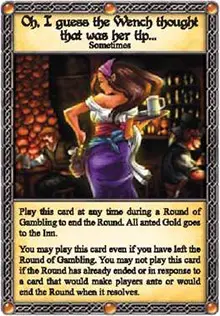
Older versions of this card (or any other card) should be played as though they had the revised wording printed on them.
There are four important points to remember about "Oh, I guess the Wench thought that was her tip..".:
It may not be played in response to "Gambling, I'm in!" or "I raise!" as a means to avoid having to ante.
It may not be played in response to a card that would end the Round.
It may not be played after the last player has passed in a Round of Gambling.
It may be played in response to an effect that forces a player to leave the Round of Gambling, even if that effect would result in only one player remaining in the Round.
The Wench thinks you should stop playing with the drinks.

Ignoring ar Negating a Drink, passing a Drink to another player, splitting a Drink, and increasing or decreasing a Drink's Alcohol Content are all considered changing the Drink's effects, so "The Wench thinks you should stop playing with the drinks" can be played in all of these cases.
"The Wench thinks you should stop playing with the drinks" cannot be used to Negate another "The Wench thinks you should stop playing with the drinks".
"The Wench thinks you should stop playing with the drinks" cannot be used to Negate a card that buys you Drinks, forces you to drink, or directly increases your Alcohol Content.
"The Wench thinks you should stop playing with the drinks" cannot be used to Negate a card that affects a Drink Event Card.
Splitting Drinks
When a card is played that can split or duplicate a Drink, it creates separate, independent Drinks. A card that affects a Drink can only affect one of the split Drinks. If a Drink is altered before it is split, then the altered Drink is split.
Mead
Mead is a Drink that has its own built-in split effect. When a player reveals Mead, players first get an opportunity to affect the Drink.
When players are done affecting the Mead, the player who revealed it chooses a player with whom to split it Players then have another opportunity to affect the split halves of the Mead.
Because players have an opportunity to affect the Mead after it is passed, the two players sharing the Mead could end up taking different effects from it!

Mead Example: Wizgille reveals Mead during her Drink Phase. No player alters the Drink, so she decides to split it with Kaylin.
This creates two copies of Mead with 2 Alcohol Content each (half of 3 rounded up). After this, Phrenk plays "Here ya go... This'll make that drink better! " on Kaylin's Mead, giving it a total Alcohol Content of 4.
Each player then drinks her Mead, so Wizgille gains 2 Alcohol Content and Kaylin gains 4.
If Mead is the result of a Drink Event Card or if Mead is revealed as a Chaser to another Drink, it may not be split with another player. The player drinking the Mead takes its full effects.
Round on the House
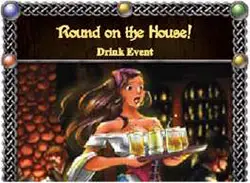
The card Round on the House is similar to a split effect, but is not considered a split effect.
When a Drink is revealed for Round on the House, each player immediately receives a separate, independent copy of that Drink.
Players do not have an opportunity to affect the Drink before it is copied, but may affect the individual copies afterward.
Drinking Contest
When a player reveals a Drinking Contest card as their Drink, each player, starting with the player whose turn it is, reveals the top card of the Drink Deck. If that card is a Drink Event, it has no effect and counts as a 0 Alcohol Content Drink.
If it is a Drink with a Chaser, the player continues revealing Drink Cards as appropriate. Once all players have revealed one or more cards from the Drink Deck, players may, in turn order, play Sometimes Cards that modify Drinks.
Anytime Cards may also be played here. When all players are done playing cards, each player drinks and discards their Drink, then the player who revealed the Drink with the highest total Alcohol Content receives one Gold from each other player.
If a player would win the Drinking Contest and pass out at the same time, that player collects Gold for winning the contest, then passes out.
If two or more players tie for the Drink with the highest total Alcohol Content, the tied players repeat the process of revealing, modifying, drinking and discarding Drinks until there is a clear winner.

If all tied players but one pass out during this process, the remaining player wins the Drinking Contest and does not continue drinking. If all tied players pass out during this process, the Drinking Contest has no winner.
Cards that increase or decrease the Alcohol Content of a Drink will affect the outcome of a Drinking Contest. If a Drink is split, Ignored, or given to another player, this does not affect the outcome of the contest.
If a player somehow takes extra Drinks during a Drinking Contest (with a card like Kaylin's "You think you're so big? Have another drink!"), these extra Drinks do not affect the outcome of the Drinking Contest.
If a Drink's total Alcohol Content is less than 0 (such as "We're cutting you off!"), it counts as a 0 Alcohol Content Drink in a Drinking Contest. The Drink will still affect your Alcohol Content as normal.
If you run out of Gold during a Drinking Contest, you will remain in the game at least until the Drinking Contest is finished. Ignore any effects that force you to pay Gold. If you do not win the Drinking Contest, you are out of Gold and out of the game!
If a player passes out as a result of drinking a Drink during a Drinking Contest, that player loses the game, but does not split their Gold among the other players until after the Drinking Contest is completed.
Players who lose the game in this way still must pay one Gold to the winner of the Drinking Contest before splitting their Gold.
Continue Reading


